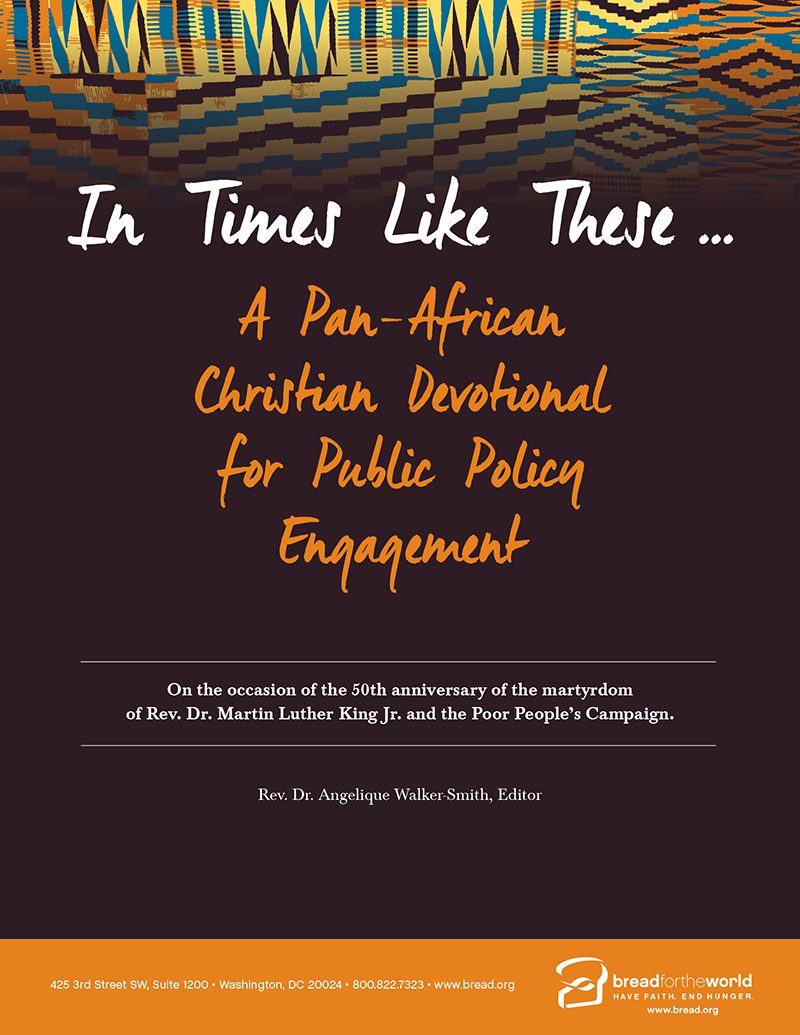Rev. Dr. Angelique Walker-Smith
In Times Like These, we give thanks for the gift of 2017 and the new year that is upon us. For those of us who have made resolutions to address the challenges we faced 2017, it would serve us to remember the 50th anniversary of the martyrdom of the Rev. Dr. Martin Luther King Jr. and the rise of the Poor People’s Campaign. These occasions can challenge and inspire our advocacy to end hunger and poverty, as they did 50 years ago.
The new weekly devotional guide, “In Times Like These: A Pan-African Christian Devotional Guide for Public Policy Engagement,” honors this legacy and vision. The devotional begins with a January focus on the vision of freedom and unity of Pan-African communities. In the case of African Americans, the annual Watch Night Service has special significance. The African American Registry tells us that on December 31, 1862, the first Watch Night Services were celebrated in black communities in America:
“The Watch Night service can be traced back to gatherings also known as ‘Freedom’s Eve.’ On that night, Black slaves and free blacks came together in churches and private homes across the nation awaiting news that the Emancipation Proclamation had become law. Lincoln had used the occasion of the Union victory at Antietam to issue a preliminary Emancipation Proclamation, which freed all slaves in the rebellious states after January 1, 1863.”
The National Archives tell us that:
“President Abraham Lincoln issued the Emancipation Proclamation on January 1, 1863, as the nation approached its third year of bloody civil war. The proclamation declared ‘that all persons held as slaves’ within the rebellious states ‘are, and henceforward shall be free.’
“Despite this expansive wording, the Emancipation Proclamation was limited in many ways. It applied only to states that had seceded from the United States, leaving slavery untouched in the loyal border states. It also expressly exempted parts of the Confederacy (the Southern secessionist states) that had already come under Northern control. Most important, the freedom it promised depended upon Union (United States) military victory.
“Although the Emancipation Proclamation did not end slavery in the nation, it captured the hearts and imagination of millions of Americans and fundamentally transformed the character of the war.”
Ultimately, the Emancipation Proclamation gave rise to the 13th Amendment, which abolished slavery and involuntary servitude throughout the entire United States in 1865.
The Pan-African devotional uses these victories as a historical venue for examining the biblical and theological meaning of freedom through Jesus the Christ, and the legislative steps necessary for Pan-African people in the U.S., the Caribbean, Canada, and Africa to realize true freedom.
The guide’s January focus explores the spirit of unity among Pan-African peoples, congressional leaders, and advocates who fought against the evils of hunger, poverty, and inhumanity. This battle continues today.
Angelique Walker-Smith is senior associate for Pan-African and Orthodox Church engagement at Bread for the World



